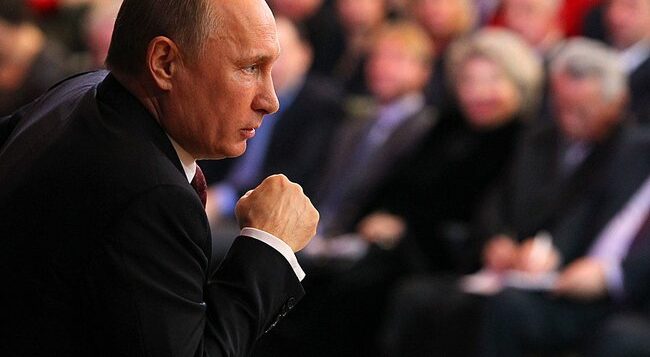Putin’ history lessons into action: How Russia should learn from Gorbachev’s legacy
This summer, we learnt of the passing of Mikhail Gorbachev, the final leader of the Soviet Union, and arguably the figure with the greatest influence on today’s global geopolitics within the last half-century.
An imperfect man with a vision for a new Russia, Gorbachev inherited the rotting corpse of the USSR, stuck in an endless war in Afghanistan, a corrupt economy and increasing dissidence in her Eastern European satellite states. As the only head of the Soviet Union to actually be born within the Soviet Union, Gorbachev succeeded a series of aged, incompetent, and sometimes even comatose rulers. His regime was under the watchful eye of a new wave of Western conservative politicians in the US, UK, and West Germany. To say that the deck was stacked against him would certainly be apt.
What made a nation great was not the size of its military, nor how much territory it controlled
Gorbachev’s programme of liberalising the Soviet Union, most notably through his policies of glasnost and perestroika, laid the foundations for a prosperous and democratic Russia. He peeled back the layers of Stalinist repression, withdrew Soviet troops from Afghanistan, and granted the Eastern Bloc nations the right to self-determination. His premiership marked the end of the Cold War and an era in the shadow of mutually assured destruction. At the time, his actions marked ‘the end of history’: the dominance of liberal democracy – a farcical concept to a modern observer, but it demonstrates the immense optimism felt by contemporaneous commentators.
Following the establishment of the Russian Federation, Gorbachev argued for a new Russian great power in the world, characterised by a system of social democracy. In 2001, Gorbachev summarised his vision for a great Russia: “Imagine a country that flies into space… [But] there’s no toothpaste, no soap… not the basic necessities of life.” To Gorbachev, what makes a nation great was not the size of its military, nor how much territory it controlled, but the basic human dignity of its people – a vision that has clearly not been translated to the current leadership of Russia.
We never did get to see Gorbachev’s vision for a great Russia. Power in the new Russian Federation successor state was placed in the hands of President Boris Yeltsin and Gorbachev’s brief foray into Russian politics (contesting the 1996 election) was entirely ineffective.
Putin’s vision for a great Russia, however, does not resemble Gorbachev’s: appealing to Soviet nostalgia with military parades, subverting the democratic constitution, and concentrating all power around himself. And of course – invading the nations of the former USSR and forcefully incorporating territories into the Russian sphere of influence. Any groundwork laid by Gorbachev for a functioning Russian democracy was gradually stripped away. A vocal critic of the new regime, Gorbachev continued promoting his vision as an octogenarian even as his health began to fail. When Putin announced his plans to run for a third term as president in 2012, Gorbachev opposed it, stating: “The electoral system we had was nothing remarkable but they have literally castrated it.”
Gorbachev was no saint, he is remembered with mixed opinions in the former Soviet Republics, as was notably demonstrated by Pizza Hut in 1998. Many Baltic citizens recall the repression they faced by the Soviet military in 1991, when it was sent to crack down on secessionism. Equally in Russia, a 2017 poll revealed that only 15% of Russians had a positive impression of the leader, compared to 46% who held a negative one, a bleak figure given that 46% of Russians claimed to have a positive opinion of Stalin and only 21% who reacted negatively.
Russia should look back at the legacy of Gorbachev rather than Stalin
According to his interpreter, Gorbachev, who spent much of his post-political career trying to strengthen the relations between Russia and Ukraine, was deeply emotional with the outbreak of war between the former Soviet Republics.
We can look at these two men, both products of the Soviet system, we can wonder what their legacies will be: the man who closed the gulags, and the man who throws his political opponents in solitary confinement. Putin’s snubbing of Gorbachev’s funeral shows the president’s disdain for the former leader. With Gorbachev’s death, the last living link to a bygone era has been severed. Ironically, the current Russian regime feels far more Bolshevik years than the final years of the Soviet Union.
When we look at the situation Putin finds himself in: a collapsing economy, a war with no foreseeable end, and increasing pressure from the West, and see that the similarities to that of Gorbachev in 1985 (albeit of his own cause), it seems likely that Russia won’t survive in its current state. Its reliance on invading its neighbours to bolster nationalism to prop up the popularity of the regime (as we’ve seen in 2008, 2014, and 2022) has finally drawn the ire of NATO. Perhaps Putin – or his successor – should look back at the legacy of Gorbachev rather than Stalin, as they try to forge a place for Russia in the international community.

Comments